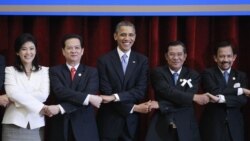It is not by coincidence that President Barack Obama’s first overseas trip after his reelection to a second term, is to the Asia-Pacific region. “From the outset of the [Obama] Administration,” said National Security Advisor to the President Tom Donilon, “we set out to identify the key national security interests that we needed to pursue.”
The Obama Administration began to re-balance U.S. foreign policy to increase U.S attention to the Asia-Pacific region. “Our approach is grounded in a simple proposition: the United States is a Pacific power whose interests are inextricably linked with Asia’s economic, security and political order. America’s success in the 21st century is tied to the success of Asia,” said Mr. Donilon.
The importance of Asia to the global economy cannot be overstated. By 2017, the region is expected to account for nearly half of all global growth outside the United States. But if it is to continue to prosper, Asia requires a stabilizing American presence, said Mr. Donilon.
“In addition to traditional security challenges and new demands for humanitarian assistance and disaster relief, there is a demand for American economic engagement and trade integration as well as strengthening of regional institutions, codes of conduct and the rule of law to resolve disputes, and the protection of individual human rights,” he said.
“Guided by these interests, the President has been clear about the future we seek . . . . our overarching objective is to sustain a stable security environment and a regional order rooted in economic openness, peaceful resolution of disputes, democratic governance, and political freedom. . .
“Our rebalancing toward the Asia Pacific—and within the region—is no short-term effort,” said Mr. Donilon in advance of President Obama’s recent trip to Asia. “It is a long-term undertaking that will continue to demand and receive our focused attention and persistence. And as the President will make clear once again over the coming days, the region will continue to be a foreign policy priority for the Obama Administration in the years to come.”
The Obama Administration began to re-balance U.S. foreign policy to increase U.S attention to the Asia-Pacific region. “Our approach is grounded in a simple proposition: the United States is a Pacific power whose interests are inextricably linked with Asia’s economic, security and political order. America’s success in the 21st century is tied to the success of Asia,” said Mr. Donilon.
The importance of Asia to the global economy cannot be overstated. By 2017, the region is expected to account for nearly half of all global growth outside the United States. But if it is to continue to prosper, Asia requires a stabilizing American presence, said Mr. Donilon.
“In addition to traditional security challenges and new demands for humanitarian assistance and disaster relief, there is a demand for American economic engagement and trade integration as well as strengthening of regional institutions, codes of conduct and the rule of law to resolve disputes, and the protection of individual human rights,” he said.
“Guided by these interests, the President has been clear about the future we seek . . . . our overarching objective is to sustain a stable security environment and a regional order rooted in economic openness, peaceful resolution of disputes, democratic governance, and political freedom. . .
“Our rebalancing toward the Asia Pacific—and within the region—is no short-term effort,” said Mr. Donilon in advance of President Obama’s recent trip to Asia. “It is a long-term undertaking that will continue to demand and receive our focused attention and persistence. And as the President will make clear once again over the coming days, the region will continue to be a foreign policy priority for the Obama Administration in the years to come.”


















